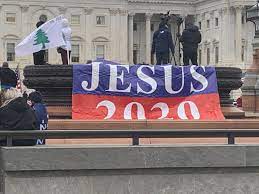In a recent NY Times column, "The Dissenters Trying to Save Evangelicalism From Itself," David Brooks addresses the present predicament of politicized Christianity in the United States As the title indicates, his focus is on American Evangelicalism, but what he writes can clearly be applied analogously to any Christian church, denomination, sect, or congregation that has either intentionally or inadvertently become preoccupied with partisan politics to the extent that it seems increasingly more like a front organization for the Republican party.
Thus, Brooks quotes Russell Moore: “We now see young evangelicals walking away from evangelicalism not because they do not believe what the church teaches, but because they believe that the church itself does not believe what the church teaches.”
While he cites Trump as "the proximate cause of all this disruption," Brooks sees Trump more as "merely the embodiment of many of the raw wounds that already existed in parts of the white evangelical world: misogyny, racism, racial obliviousness, celebrity worship, resentment and the willingness to sacrifice principle for power." Meanwhile, citing research by the political scientist Ryan Burge showing that, as of 2020, roughly 40% of those "who called themselves evangelical attended church once a year or less," Brooks suggests that what has been a traditional religious marker for many Americans is now "just a political label" for some. That too might possibly apply more broadly beyond the officially "Evangelical" brand to others whose Christian identity may be less about religious belief and belonging and more about contemporary tribal political identity.
So, while for decades now "evangelical pastors have found that their 20-minute Sunday sermons could not outshine the hours and hours of Fox News their parishioners were mainlining every week," the problem may be not just "that the klieg light of Fox was so bright, but also that the flickering candle of Christian formation was so dim."
What challenge to ecclesiastical business as usual could be more basic?
One further consequence, which again might apply more broadly across the American religious spectrum is how "the atmosphere within many Christian organizations has grown more tense and bitter." One sign of that is how "there is now a common desire to pummel, shame and ostracize other Christians over disagreements." Brooks identifies this as "a profound moment of turmoil, pain, change,", which, ever the optimist, he also hopes may also be one of "possible transformation."
Of all things, this reminds Brooks of the familiar saga of those 20th-century intellectuals who adopted and then abandoned doctrinaire communism. While leaving communism and their communist comrades behind "was brutal for many," they also, Brooks suggests, experienced liberation. "They began to think new things, find new allies and sometimes embark on new causes.” He recalls that experience as a promising model for some Christian Evangelicals. "They’ve broken from the community they thought they were wed to for life. Except for them it wasn’t God that failed, but the human institutions built in his name. This experience of breaking, rethinking and reorienting a life could be the first stage in renewal."
Brooks identifies examples of this trend, people like Peter Wehner, Michael Gerson and David French, who "are courageously and passionately opposing the Trumpification of American Christianity. They’ve become leading spokesmen for reform and participants in the discussions that are now happening over what needs to be done."
While what those figures are trying to do is significant - spiritually for them, first of all, as it was for the ex-communists Brooks references, I am reminded that communism as a political force outlasted those mid-20th-century conversions (as indeed variations on Marxist philosophy also continued to thrive for decades). It is hard to see into the future, of course, and predictions about the trajectory of American religion, especially in recent decades, have been contradicted by unexpected secular trends (Trump, among them). One wonders how much hope one should hold out for effective alternatives to Trumpified American religion.
On the other hand, Brooks is, I think, on to something in seeing a more promising future in generational change and demographic differences, which he believes the American church to become "more like the global church."
On the other hand, one should never underestimate the staying power of institutional structures (normally a good thing for societies). As Brooks himself acknowledges, American evangelicalism "has historically had a Christian nationalist current and also a more justice-oriented current, which was powerful as recently as the 1970s. Both of these currents ebb and flow over the decades.."
For David Brooks' complete column, go to:
https://www.nytimes.com/2022/02/04/opinion/evangelicalism-division-renewal.html
Photo: Some of the Christian imagery at the January 6 insurrection, from religionunplugged. com.


No comments:
Post a Comment